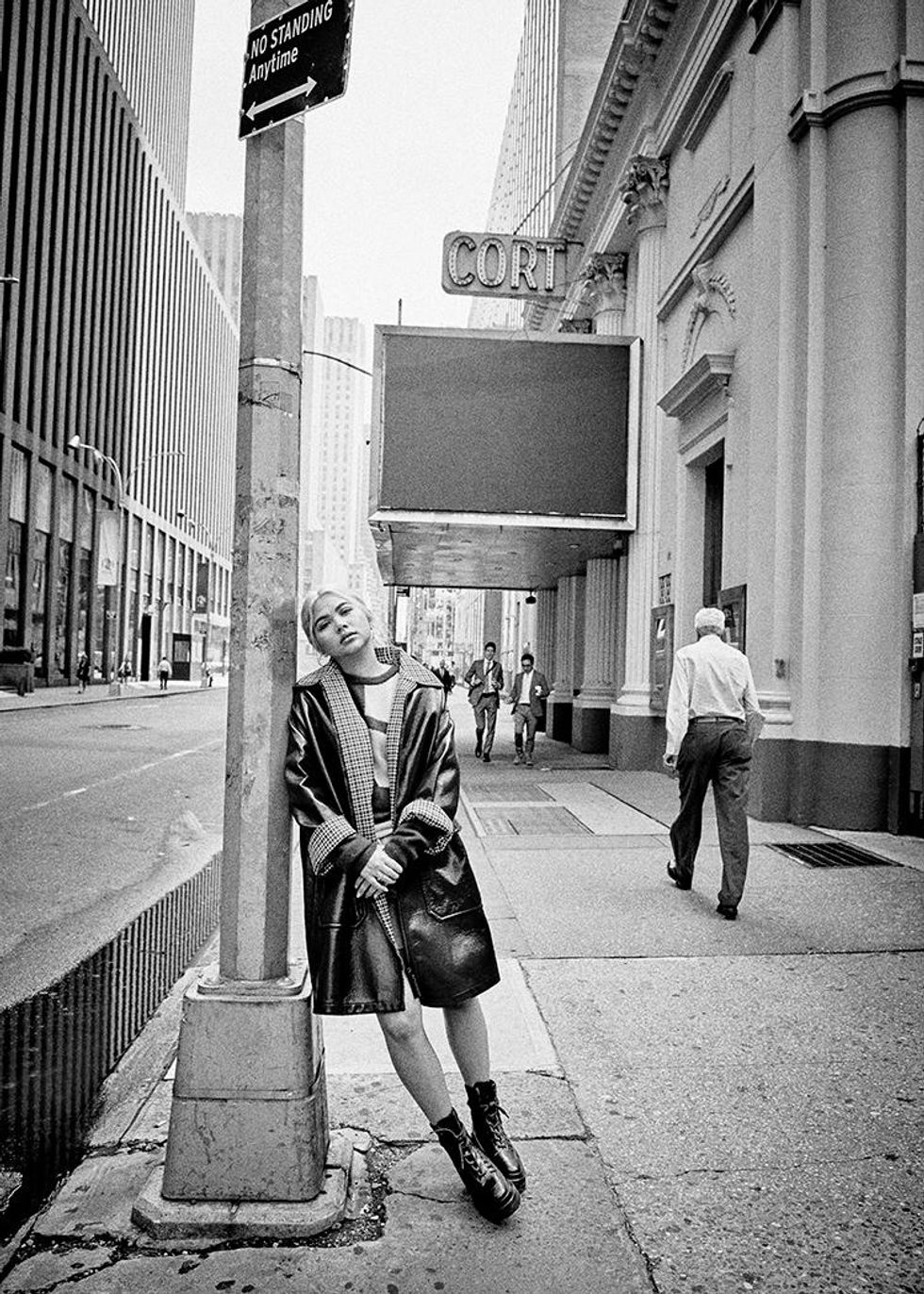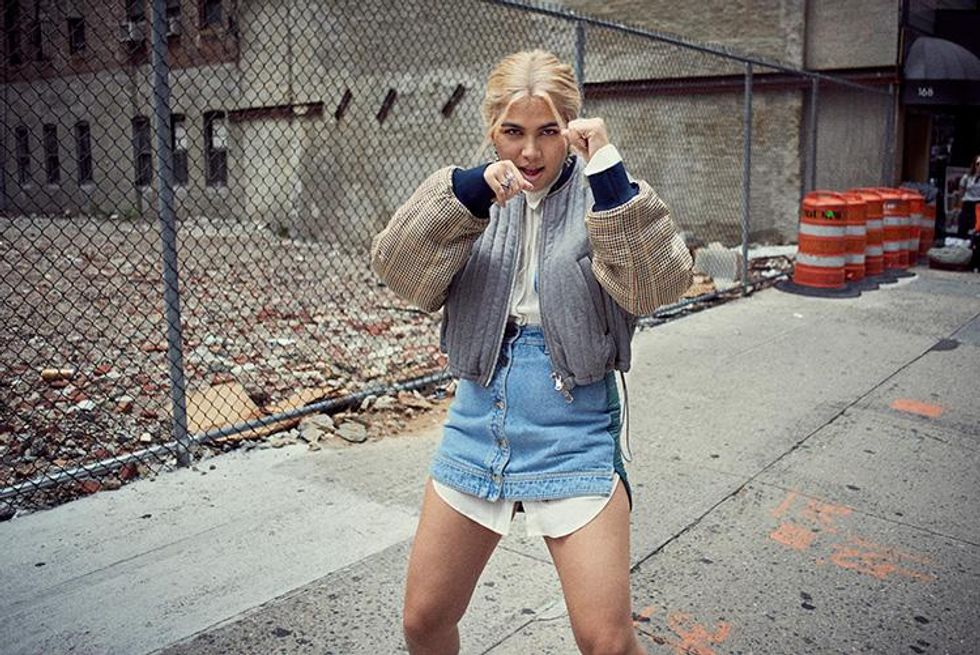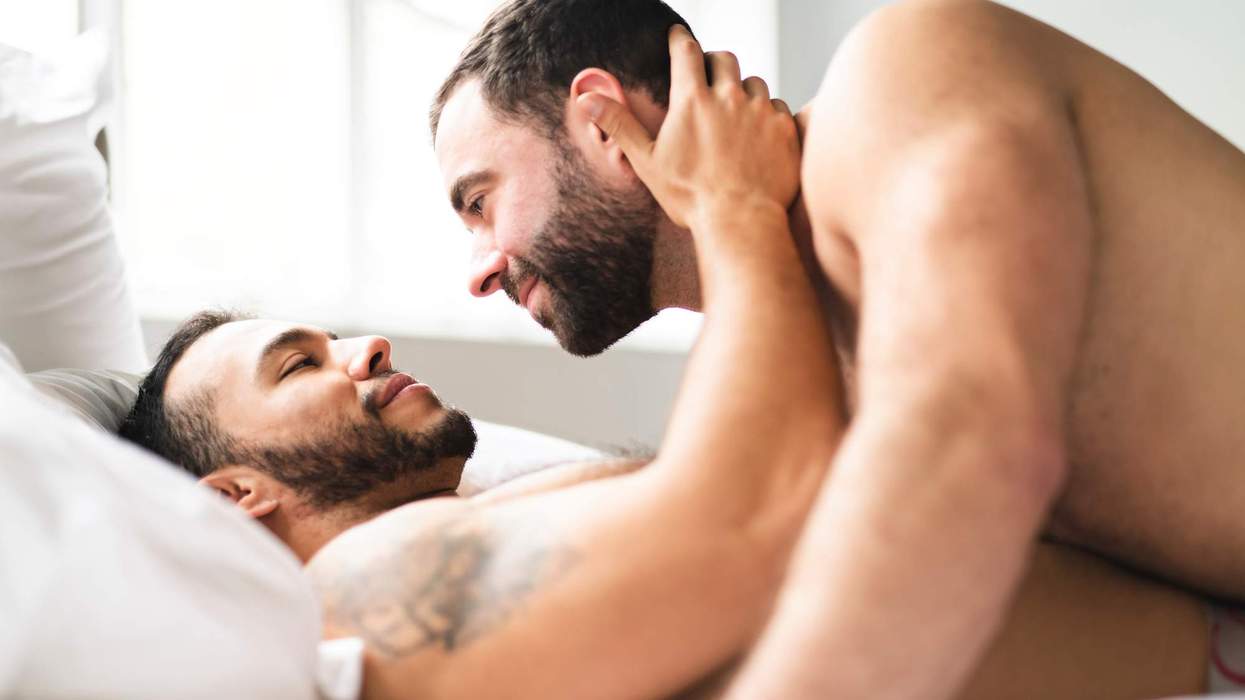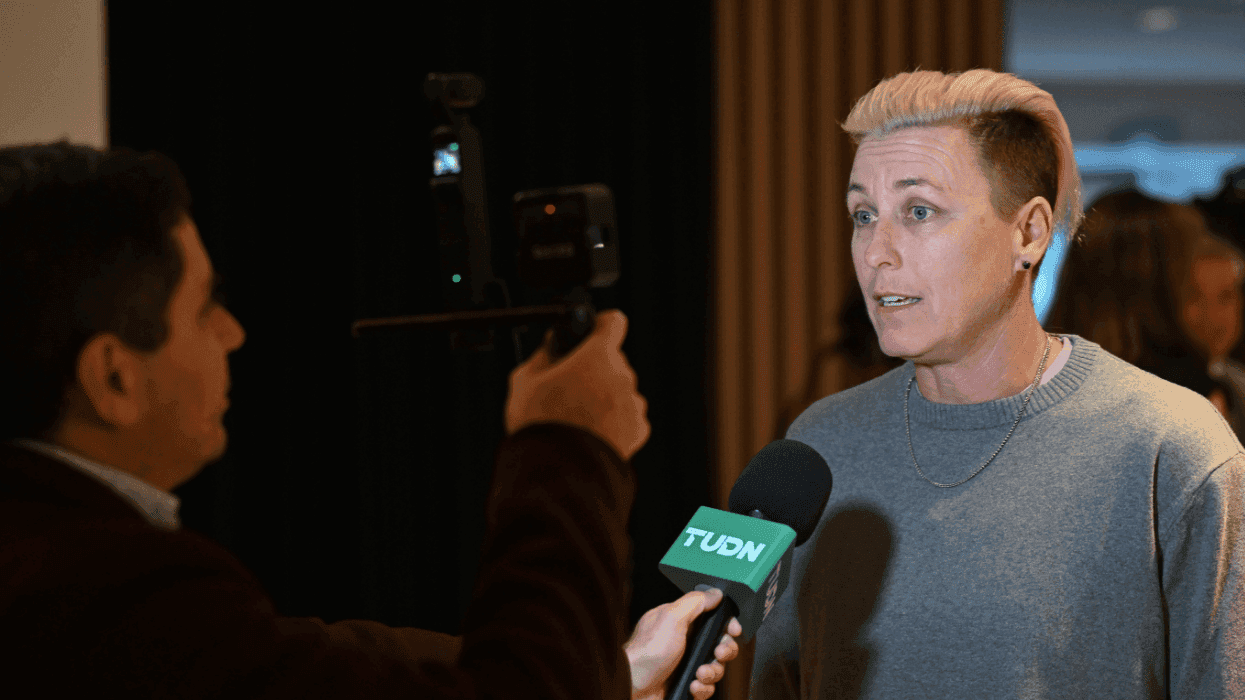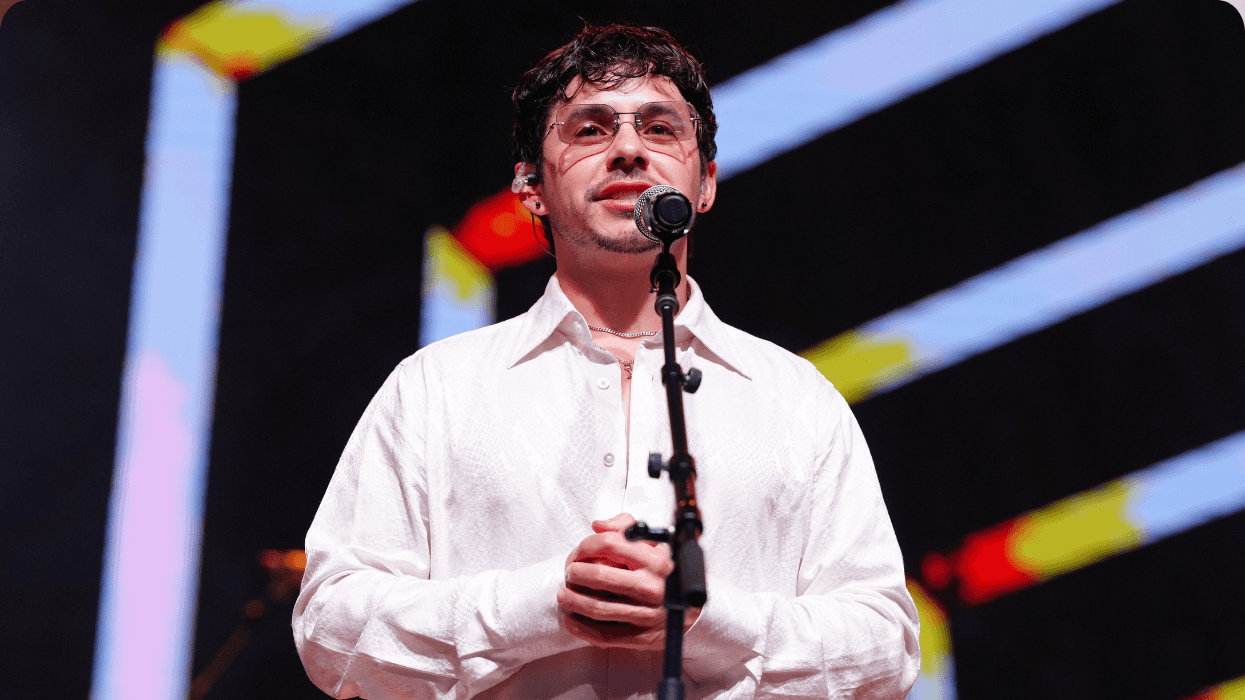Hayley Kiyoko is a 27-year-old bona fide pop star whose strong, silken voice is played across dance floors, streaming services, and radio waves worldwide. She's also an outspoken, unapologetic lesbian and person of color. In 2018, this once-remote possibility is a reality.
"Art affects a lot of people," says Kiyoko, whose own deeply affected fans have come to lovingly call her Lesbian Jesus. "So it's so important as an artist to approach it seriously. And I do."
Related | The Queer, Colorful Energy of Hayley Kiyoko
Surprisingly, it didn't seem to take that long for the world to take Kiyoko seriously, too. She grew up in Westlake Village, Calif., a small city just north of Los Angeles, and she recently went on record saying she'd realized her own queerness at 6 years old. Like many megastars -- Britney, Christina, Miley -- Kiyoko got her start acting and performing for Disney. She spent years writing, recording, and releasing music, but then "Girls Like Girls," a 2015 no-punches-pulled lesbian anthem from her second EP, This Side of Paradise, changed her life forever. The single was a coming out, of sorts, for Kiyoko, who until then had never mentioned her lesbianism in her songs. The music video, also directed by Kiyoko, depicts two teenage girls with a mutual crush who fend off an abusive guy. That video is currently just shy of 100 million views on YouTube.
"I didn't know where I was going to end up in the industry," the artist says, "but I always knew I wanted to tell stories. And to create my own."
The breakthrough success of "Girls Like Girls" led to a deal with Atlantic Records and this year's Expectations, Kiyoko's first full-length studio album. It's a beautiful, refreshing collection of lady-love ballads and dance-ready pop bangers. And nothing about Kiyoko's queer identity seems to have hindered the record from being both critically and commercially successful. If anything, it fed rebel fire to all that youth-powered success. Kiyoko has become a gay pop inspiration to millions, even if that wasn't exactly the plan. "I had no idea I would have such a purpose and be important to so many people," Kiyoko says (even as #20GAYTEEN, a social media tag she popularized, continues to go viral).
Kiyoko's steady rise garnered new attention in August, when she was nominated for Best New Artist at the MTV Video Music Awards (VMAs) and won the VMA for Push Artist of the Year, beating SZA, Khalid, Lil Xan, and several others for the coveted Moon Person. Running away with her trophy as crowds cheered, Kiyoko was intercepted by Billboard, to whom she exclaimed triumphantly, "This validates any queer woman of color that you can follow your dreams!" It's a public sentiment that would have likely made Kiyoko a pariah just a decade ago. Out was on the phone with Kiyoko just a day before that awards show, while she was sequestered inside the T-Mobile Arena in Las Vegas, closing out a nationwide tour with pansexual singer Brendon Urie and his band, Panic! at the Disco. She was a whole other kind of jumpy than when she'd later step off the VMA stage, victorious.
"I've never been to an awards show before," she says, "and I've never been nominated for an award. This is very new for me."
Everything about Kiyoko is new. Many up-and-coming recording artists claim to champion the LGBTQ community, too often in order to swiftly amass a dedicated and lucrative gay audience. But few are the stars who genuinely share in our lived experiences, making their very presence resonant for listeners. Kiyoko makes a new normal feel within reach -- where acceptance replaces tolerance, and where young people and young artists who break sexual and binary traditions can feel comfortable without fear of industry reprisal. But she's hardly blind to the need to keep reaching.
"I get to travel across the world and meet all these kids," Kiyoko says, "and, to be honest, most of the LGBTQ children aren't accepted by their families. There's still a lot of judgment out there." And in Kiyoko's world, too. She's blessed to be riding high as opposed to grappling with rejection and abandonment, but judgment takes many forms, and she's found that stereotyping is alive and well. "I've done covers and spreads for magazines where they'll dress me up in all rainbows," she says. "And I'm like, 'Well, I'm a person, not a just gay person.' You don't have to dress me in rainbows just because of who I am and what I like. There's still so much growth and change that needs to happen in the mainstream."
If Kiyoko sounds politically charged, there's a reason. "I'm political in the sense that I care about other humans," she says. "I care about our society, I care about growth, and obviously I care about our rights." She's recently used her platform to call out things she sees as problematic or offensive, such as earlier this year when she publicly blasted Rita Ora's single "Girls" for fetishizing female-on-female sex. (The single -- sung by three ostensibly straight women, save Ora, who later came out as bisexual -- featured lyrics like, "Sometimes, I just wanna kiss girls, girls, girls / Red wine, I just wanna kiss girls, girls, girls.")
"A song like this fuels the male gaze while marginalizing the idea of women loving women," Kiyoko wrote in a statement aimed at Ora. "I don't need to drink wine to kiss girls; I've loved women my entire life. This type of message is dangerous because it completely belittles and invalidates the very pure feelings of an entire community." She finished with, "We can and should do better."
Ora has since apologized for "Girls," but not before gently deflecting Kiyoko's comments by unveiling her own history of "romantic relationships with women and men," a revelation many felt played more like damage control than solidarity. Of her remarks toward the song itself, Kiyoko says, "If I were to speak up about every single thing I see like that, I would never stop speaking. Everyone has their own opinions, but I speak up for things that remind me of struggles I've had. And I really try to be honest with my opinions, and that's what I was doing there."
Honesty has helped Kiyoko secure a seat with the "cool kids," as she puts it, and her star has been rising even faster with the hit single "What I Need," featuring fellow queer artist Kehlani. There's also a worldwide tour in the works. It's all the stuff that dreams are made of, but Kiyoko truly doesn't seem to be letting it go to her head, instead staying razor-focused on the power of queer representation. "I've been an unsigned artist for most of my career and had to do everything myself," she says. "So it's amazing to be able to show kids that you can literally start from the bottom, get to the VMAs, walk the red carpet, pull down an award, and love women at the same time. It's all possible."
Photography by Andrew Boyle
Styling by Ade Samuel for The Only Agency
Hair: Korey Fitzpatrick for Exclusive Artists using Oribe Haircare
Makeup: Marla Vazquez using Hourglass Cosmetics
(Intro Photo: Coat, sweater, and shorts by Bottega Veneta. Shoes by Pierre Hardy.)



